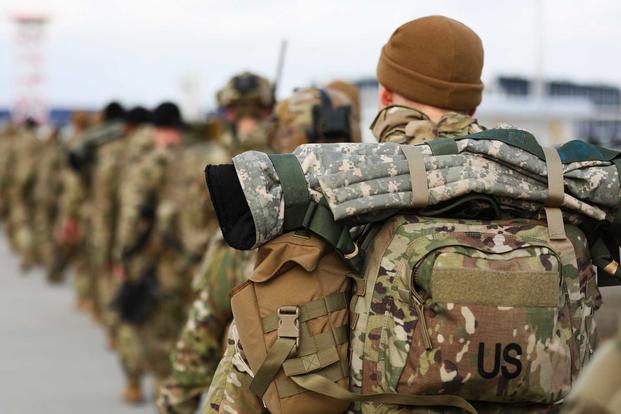As the United States mobilizes to forestall a Russian invasion of Ukraine, Congress is at risk of being missing in action.
Senators for weeks have been negotiating a bill that could garner bipartisan support to deter Russian President Vladimir Putin from invading Ukraine or punish him if deterrence fails.
Among the proposals that were expected to be included in the bill was more military aid for Ukraine, including a lend-lease program that would allow the United States to send Ukraine more weapons without immediate payment.
But as of Thursday, senators appeared to be at an impasse even as U.S. officials warn Russia could invade at any point, raising the prospect that Congress could fail to take any action before an invasion.
"It should have been done two weeks ago," Sen. Jeanne Shaheen, D-N.H., said when asked whether she's worried a deal won't be reached before an invasion.
Negotiations on aid to Ukraine have stalled over a partisan impasse on sanctions, including what to do about the Russia-to-Germany natural gas pipeline known as Nord Stream 2.
Roughly 3,000 U.S. troops are being repositioned or deployed around Europe to support NATO allies worried a Ukrainian conflict could spill into their countries. Russia has denied it's planning to again invade Ukraine, after invading Crimea in 2014.
U.S. soldiers have started trickling into Romania, Poland and Germany, with more expected to arrive in the coming days.
None of the U.S. troops is expected to enter Ukraine, which is not a NATO ally.
But the Biden administration has taken other steps to shore up Ukraine's defenses, including recently sending another $200 million in Javelin anti-tank missiles, ammunition and other military hardware. Over the last year, the United States has provided $650 million in military aid to Ukraine.
Congress has been getting regular updates on Russia's military buildup on Ukraine's border, including full House and Senate briefings last week and a closed-door Senate Armed Services Committee briefing Thursday.
And as more than 100,000 Russian troops encircle its neighbor, there is bipartisan support in Congress for more military aid for Kyiv, even if the sanctions debate has prevented action.
In addition to eyeing more funding for military aid, lawmakers have proposed the lend-lease program for Ukraine in which the United States could quickly ship weapons and other military equipment with the promise of repayment later.
The last time the United States had a lend-lease program was World War II.
A stand-alone Senate bill for a Ukraine lend-lease program has 15 sponsors from both parties, and the proposal was expected to be folded into the larger bill senators have been negotiating, which has since stalled.
Asked whether he's worried Ukraine won't get the supplies it needs if the lend-lease program remains stuck in the sanctions impasse, Sen. John Cornyn, R-Texas, one of the lead sponsors of the lend-lease proposal, noted that the United States and other NATO countries have been sending Ukraine support.
"The problem is they're just overmatched dramatically by the Russians," Cornyn added.
With the broader bill going nowhere, senators said they are discussing alternative plans, including possibly holding separate, side-by-side votes on the Democratic and Republican proposals, or voting on just the noncontroversial proposals such as military aid.
But the Senate has other votes on its agenda next week and is scheduled to take a one-week recess the following week, as the world braces for the possibility of Russia invading when the Ukrainian ground freezes in the middle of the month or after joint Russian-Belarusian military drills end Feb. 20.
"I would much prefer that we would have actions that ultimately could be used to deter Putin," Senate Foreign Relations Committee Chairman Bob Menendez, D-N.J., said when asked about the risk of not having a bill before an invasion. "That doesn't mean that the administration doesn't have their own set of actions that can be used to do that. But I would like to have the power of a very aggressive sanctions option to be able to do that as well and augment what the administration is doing."
-- Rebecca Kheel can be reached at rebecca.kheel@military.com. Follow her on Twitter @reporterkheel.
Related: US Troops Trickling into Europe as Putin Masses Forces Around Ukraine











